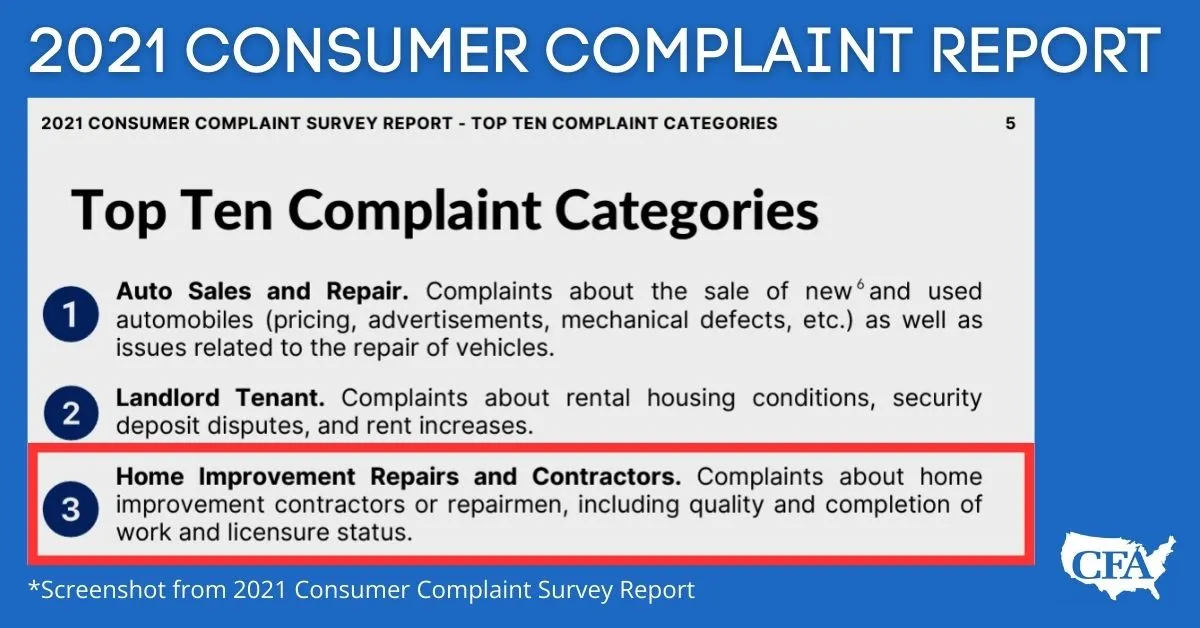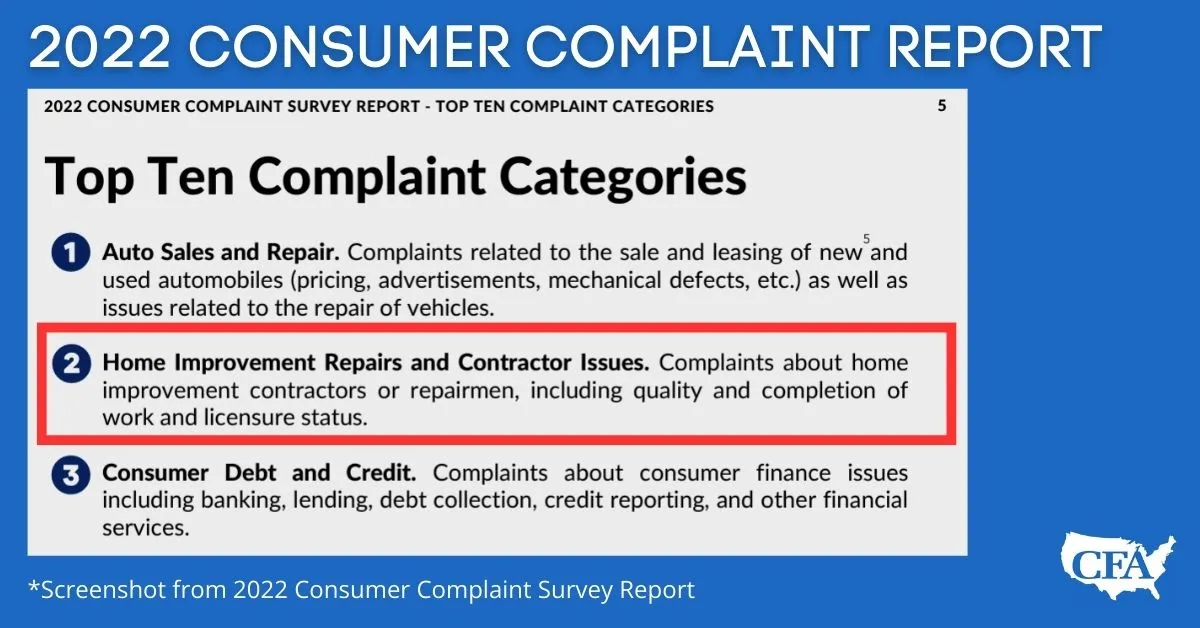Hiring a trustworthy contractor for your home improvement project is critical.
Without one, there’s a lot that can go wrong.
My name is Michael Casolaro, and I’m the President of MCAS Roofing & Contracting, Inc. and County Center Roofing in Westchester County.
For the last 30 years I’ve been working on roofs in Westchester.
Over the years, I’ve learned to identify the honest, qualified contractors from the unqualified ones.
Every year, home service businesses and contractors are amongst the most complained about businesses in local communities.
Tons of qualified home service businesses are out there, they’re just not getting found.
Now, the problem is getting worse.
In 2021 home improvement contractors were #3 on the Consumer Federation of America‘s top 10 most complained about business categories

In 2022, Home Improvement Contractors jumped to the 2nd most complained about business category.

It’s an important problem to solve because…
Your home is what keeps your family safe, and probably one of the most expensive things you own. Homeowners need qualified, honest home improvement contractors.
You deserve simple steps to help you hire the best local contractors for your home improvement projects. You don’t have time for any fluff.
Nobody gives you a checklist to help you protect your home when hiring a Westchester contractor or trade professional. So, I created one.
I’m a roofer, and these tips have helped me hire contractors to work on other areas of my home. My friends and family have found this checklist for hiring a Westchester contractor helpful. So, I thought you might too.
Here’s an easy to follow outline of everything I like to remember when hiring and working with the best Westchester home improvement contractors.
Step #1: Make a List of Potential Contractors
The first step is to create a list of contractors that might be a good fit for your job. Here’s how I do it.
Seek referrals from friends and family, as personal recommendations can be valuable. They’re my favorite if coming from someone I know is reliable.
Read online reviews to gauge customer satisfaction and reliability. Look for contractors with high ratings and positive feedback. The more reviews a contractor has, the more trustworthy their rating is.
Verify the contractor’s license using the Westchester NY contractor database for home improvement projects or the Trade License database for specialized professionals like plumbers or electricians.
Ensure the contractor is not listed on Westchester’s “Renegade Renovator” list, which could indicate past issues with their work.
Step #2 - Choosing The Right Contractor

Create a shortlist of 2-5 potential contractors you find during your research. Then, contact them to gather more information. Most people choose to get 3 estimates from 3 different contractors.
Request written estimates for renovations, remodels, or costly repairs. For smaller jobs, 1 or 2 estimates may be sufficient.
Make sure you are clear on the entire scope of work your contractor is specifying, including materials. That’s how you can compare “apples to apples” when you get your estimate.
Remember, not all contractors specify the same quality of work, or use the same quality materials. If your contractor does not want to elaborate on the specifics of the work, consider this a red flag.
Ask your potential contractor about the materials they use, discuss quality, and material warranties.
Ask your potential contractor if they use skilled labor and what guarantees they offer on their work.
Understand that warranties from manufacturers may be void if damage is the result of installer error. Basically that means, you might not be covered if there’s a problem if your contractor is the one at fault. So make sure the warranty your contractor provides covers their own workmanship as well.
Verify that your contractor is a certified installer of materials they use, if required. For example, MCAS Roofing & Contracting, Inc. is a Certified Installer of top roofing systems such as GAF, CertainTeed and DaVinci Roofscapes. This confirms that the contractor is qualified to offer warranties offered by the manufacturers, and has experience working with those materials.
If your contractor is recommending you replace something on your home, when you were expecting to repair it, ask them questions to learn more.
Check the International Association of Certified Home Inspectors, or NACHI for a general life expectancy of various home appliances, products and components. Remember these are only general guidelines. Many factors will impact lifespan including weather, maintenance schedule and more.
Step #3 - Before You Start Your Project
After you choose the best contractor for your home improvement project, it’s time to create the right documentation so you’re always protected.
Get everything in writing including payment terms, specifics about materials, and costs.
Confirm if you need a permit. If you’re not sure, you can contact your town building department. Your contractor should be able to help you with this as well. But, you can always double check on your own to be sure.
If your contractor is unwilling to deal with your town Building Department, this is another red flag. It might mean, they’re not licensed, or in bad standing in your community.
For small projects and repairs under $500 a brief list or outline might be enough.
Projects over $500 in NYS are required to have written contracts.
Compare the estimate you receive to your contract before you sign it.
Verify the contract includes crucial details like the contractor’s legal name and address, start date, materials used, potential additional costs, warranties, TAX ID number and insurance.
Verify the contract includes a payment schedule.
Get a final copy of your contract, signed by you and the contractor BEFORE they start your project.
Make sure your contractor has a comprehensive insurance policy like this one that includes general liability, worker’s compensation, auto, and additional insured coverage.
- Obtain a copy of the contractor’s Certificate of Insurance and confirm you are added as an additional insured party. It’s the best way to ensure you are 100% protected.
Step #4 - Communicating During Your Project

After the contract is signed, here’s a few tips for communicating with your contractor during your project.
Recap all conversations you have with your contractor by sending a short email. Sending a short email to your contractor after a phone call will ensure you are both on the same page. Plus, if future issues arise you’ll have the evidence you need.
After you sign your contract, you have 72 hours to cancel your contract for any reason under NYS law.
If your contractor calls to advise you of delays, unexpected costs, permitting issues or anything else that changes the contract or expectations, confirm it in writing. Reputable contractors will usually do this themselves. If they don’t, I suggest you do.
What to Do If Something Goes Wrong
If you start feeling like there is a problem with your project, documentation will be your biggest friend.
If you have difficulty reaching your contractor, make a log of all of your attempts. Each time you call, text or email them make a note of it. If it’s been more than 3 days, usually I suggest people send a Certified Letter, with a Return Receipt to the Contractor’s legal address so you have proof they are aware of your concerns.
If you need to cancel a contract, do so within three days in writing, and consider sending an email and a certified letter for documentation.
- Maintain detailed records of all interactions with the contractor and take screenshots of attempted phone calls.
Who to Contact if Something Goes Wrong
Contact your bank or financing source to stop payment if necessary.
Reach out to the Westchester County Department of Consumer Protection directly at (914) 995-2657 or [email protected] for assistance.
- File a complaint with Westchester County Consumer Protection or the NYS Consumer Frauds Bureau if needed.
Hopefully these steps have made you better prepared to hire a home improvement contractor in Westchester County, NY! Remember, nothing will ever protect you 100% from scams and unqualified contractors. However, by staying vigilant and learning what to look for you can have confidence in home improvement decisions.
